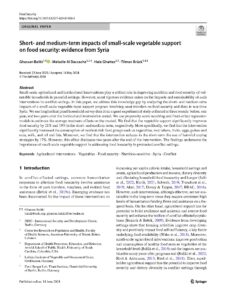Small-scale agricultural and horticultural interventions play a critical role in improving nutrition and food security of vulnerable households in peaceful settings. However, scant rigorous evidence exists on the impacts and sustainability of such interventions in conflict settings. In this paper, we address this knowledge gap by analyzing the short- and medium-term impacts of a small-scale vegetable input support program involving asset transfers on food security and diets in war-time Syria. We use longitudinal panel household survey data from a quasi-experimental study collected at three rounds: before, one year, and two years after the horticultural intervention ended. We use propensity score matching and fixed-effect regression models to estimate the average treatment effects on the treated. We find that the vegetable support significantly improves food security by 21% and 19% in the short- and medium-term, respectively. More specifically, we find that the intervention significantly increased the consumption of nutrient-rich food groups such as vegetables, root tubers, fruits, eggs, pulses and nuts, milk, and oil and fats. Moreover, we find that the intervention reduces in the short-term the use of harmful coping strategies by 17%. However, this effect dissipates two years after the end of the intervention. The findings underscore the importance of small-scale vegetable support in addressing food insecurity in protracted conflict settings.
Publication Details
- Year of Publication: 2024
- Region/s: Middle East & North Africa
- Theme/s: Human Development · Humanitarian Emergencies · Micro-Data Collection
- Research Topic/s: Agriculture · Disasters & Emergencies · Food Security & Nutrition
- DOI: http://doi.org/10.1007/s12571-024-01460-1







